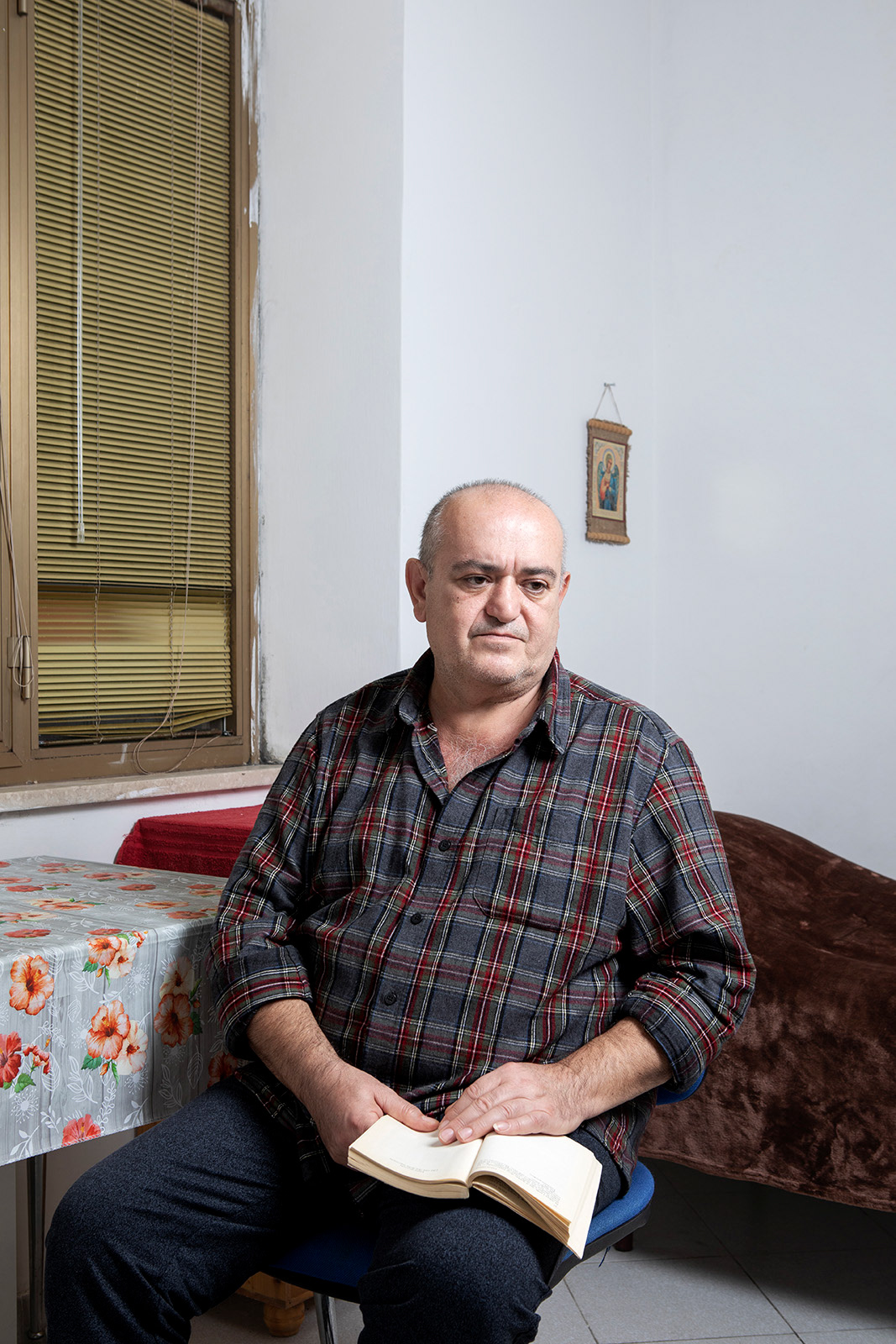"They did not find, waiting for them, a loaf of bread that tastes of salt—only open arms. But Dante, the great exile, knew that the pain of leaving “every beloved thing” is an arrow that pierces the refugee’s heart even more fiercely than the harshness of what they find in the country where they arrive. The calendar date changes for the more than one hundred thousand Ukrainian refugees welcomed in Italy since the beginning of the war, but in 2023 the day of their return is still unwritten. For many months now, a suspended Ukraine has been living in our country—an incomplete nation made almost entirely of women and children, a limbo overflowing with helplessness, suffering, and eyes fixed on news screens that never bring good news.
An Italian photographer has travelled through that country: his name is Tommaso Ausili, he has spent years working on the fronts of global social crises, and he has won a World Press Photo award. He knocked on the doors of hotels, of rooms lent out, of reception centers, of apartments offered by parishes and NGOs—places where this halved people have camped. He took portraits, listened, and transcribed stories all alike and all different. They tell what it means to wake up one morning with the sky blazing red and explosions in your ears, to flee to bunkers, to realize that even that is not enough to survive, to decide within a few hours to abandon everything, to reach any place as long as it is outside, far away, to leave by any means, children in hand, sometimes a dog, a cat.
Stories that resemble those of all refugees from every place and time: bad encounters and good Samaritans, tortuous odysseys, crossings paid dearly for, violence lurking, fear, danger, despair. The world of acquired certainties is turned upside down. The normality that was supposed to last forever vanishes. Svetlana the manicurist, Antonina the kindergarten teacher, Nadiya the jeweler who now cleans in exchange for hospitality, Natalia the university professor of English, Inna the fashion designer: all gone, the life before no longer exists. And now, the waiting. In these hotel rooms, which the photographer discreetly includes in the frame, flowers appear in a vase, bedside lamps, a crucifix on the wall, wallpaper slightly peeling. A refuge that is not home, but at least is safety. Medical care, school. But not serenity. Oksana, who used to run a restaurant, cannot stop crying as Tommaso takes her portrait. And then the children, the teenagers. Slaviana, eleven years old, backpack with kittens, barefoot on the bed taking a violin exam online with the Odessa conservatory—she is fragile and sweet, but a plastic dinosaur on the table roars for her. Zakhar and Nazar, five-year-old twins, wearing t-shirts that say “be free,” hold hands in the hallway of the hotel, even though they are too young to have seen The Shining. The broken future of children cries out for vengeance to the sky: it is the shamefully unkept promise between the human species and its own destiny.
There is no war in these images, but there is no peace either. And yet, to a distracted eye they could seem like photographs from our own family albums, or now from our smartphone memories. The Ukrainian exodus strikes us because the identification is immediate—in those life stories, in those clothes, in those faces. An Italy all too often xenophobic did not bat an eye this time: no cries of “invasion.” The trauma of “it could be me” overwhelms us in these photographs of exile, with a power increased—not diminished—by the absence of the horrors of the battlefield. Perhaps we will learn, from these images, to feel empathy even for the tragedy experienced by those who resemble us a little less." (Michele Smargiassi on La Repubblica, 2023, January 2nd)
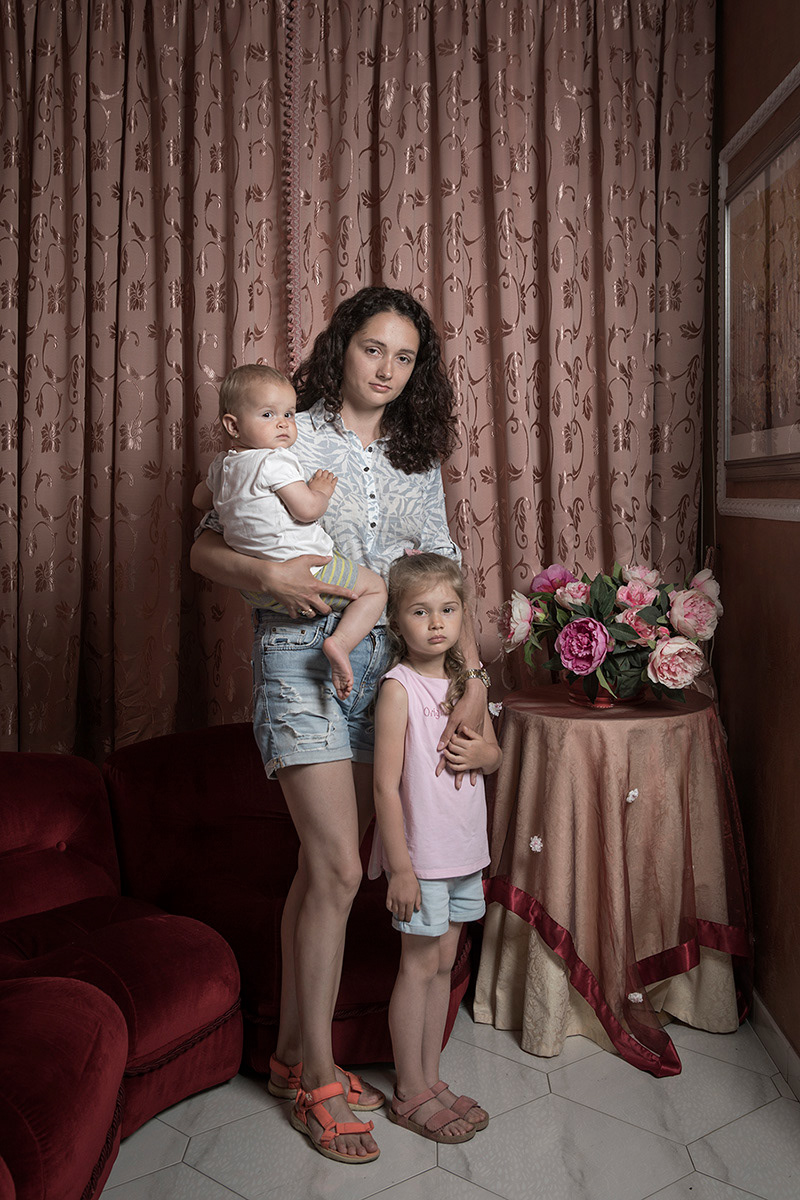
iuggi (FR), Italy, May 18, 2022. Alexandra Klimova portrayed with her daughters Adelina and Sara in the lobby of the Lorella hotel in Fiuggi, where she is staying with other Ukrainian refugees. Alexandra comes from Karchiv, where she worked in a travel agency. On February 25, after hearing her home shake due to a bombing, she and her husband decided to leave the city. Having a dog in the family, it was not possible to take refuge inside a bunker so they decided to move to the country house of their in-laws, a few kilometers from Karchiv. She stayed there for three weeks. On March 15, with the advancing Russian army, he decided to flee. Her husband took her and her daughters to Poltova in central Ukraine. There they said goodbye: her husband took refuge in Odessa while Alexandra and her daughters took a bus that would take them to the Czech Republic, where some of her husband's colleagues were waiting for her and where they arrived after three days and after waiting 12 hours for cross the border into Poland. After resting in a hotel for a few days, she took a plane ticket to Rome and from there she was taken to Fiuggi by the Civil Protection.
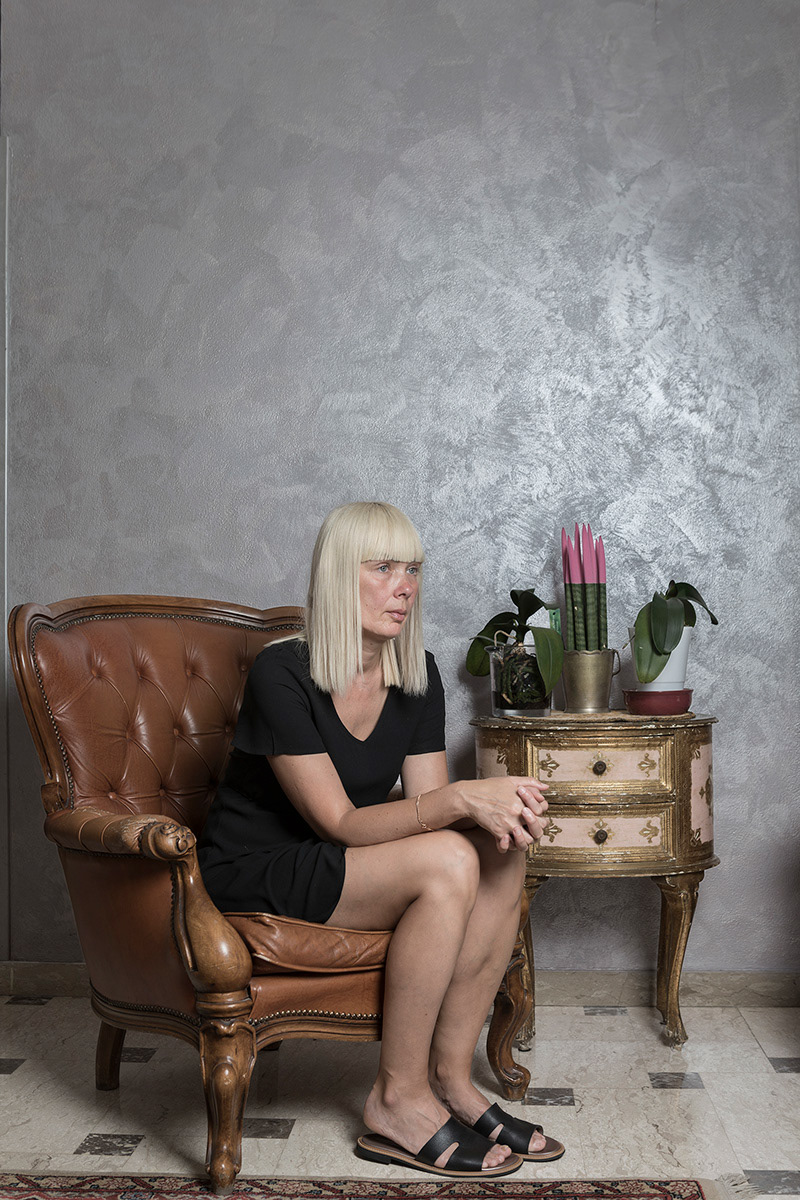
Fiuggi (FR), Italy. 1 June 2022. Inna Govorova, 51, portrayed in the lobby of the Hotel Holiday in Fiuggi, where she is staying with other Ukrainian refugees. Inna comes from Kharkiv, where she worked as a stylist in an atelier, while her husband Ghennadiy worked as an interior designer. She arrived in Italy on April 18 together with her 30-year-old daughter Angela and her 4-year-old daughter Olivia. They left Kharkiv 10 days after the war began. They stopped for a month in Poltava, in central Ukraine, hosted by a volunteer, and from there they took the train to Lviv. From there they took a bus to Prague and then a plane to Rome. They chose to come to Italy because Angela lived for 4 years in Naples, and knows the Italian language and culture
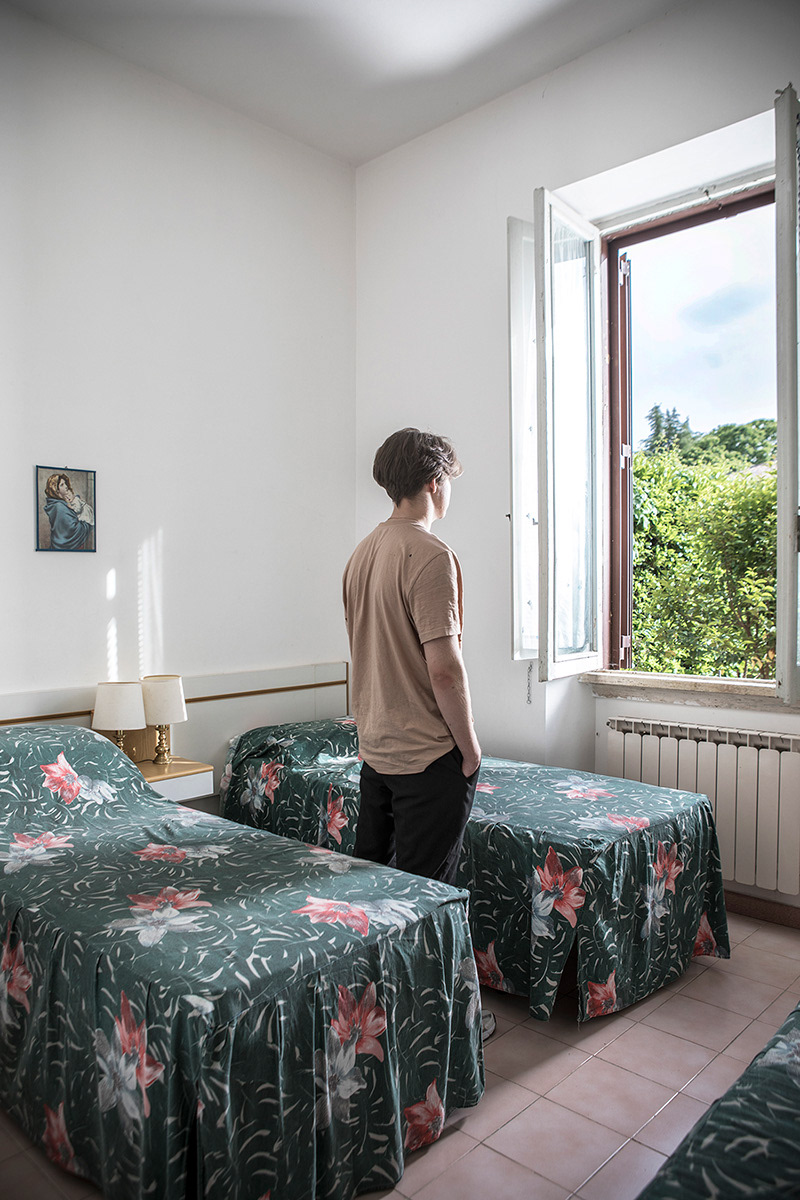
Fiuggi (FR), Italy, 25 May 2022. Mark (invented name) portrayed in Fiuggi in his accommodation made available to him by Caritas. Mark preferred not to make his real name public and his face not recognizable. She is 21, from Odessa, and has been in Italy since March 29. Mark worked as a sailor for a Ukrainian shipping agency. He began his first 6-month contract in September 2021, departing from Nikolaev on a freighter carrying various goods, including wheat and cereals bound for Israel. On February 24, when the war broke out, he was in the Netherlands, returning from a 10-day trip from Brazil. In March 2022, the freighter he was traveling in was supposed to dock in Russia to load cargo near St. Petersburg. The crew initially refused, but faced with complaints from the agency, which would have been forced to pay a hefty penalty, they had to accept the job. Once docked, the Russian authorities boarded the cargo, searching the ship and crew and subjecting it to a pressing interrogation. On 29 March, near Suez, on the occasion of a crew change, the shipping agency advised the dismantled crew not to return to Ukraine. Mark thus harnessed himself on a plane that took him to Rome, and from there to Fiuggi, where a family friend was waiting for him.
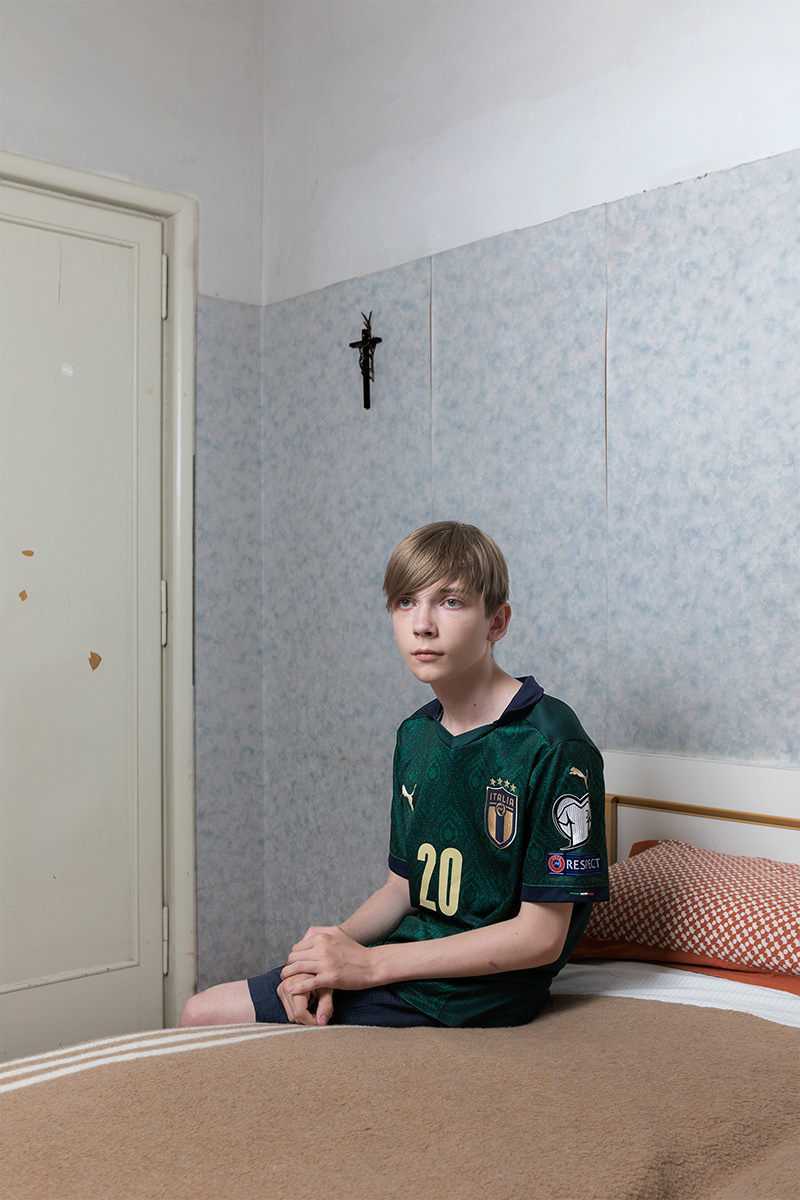
Fiuggi (FR), Italy. 1 June 2022. Rostyslav MelnyK, 13, portrayed in the First Reception House provided by Caritas / diocese of Anagni and Alatri to him and his family. Rostyslav comes from Korostyshiv, in the Zhytomyrska region, together with his mother Alla, his sister Oksana and her son Mark. Alla owns a homeware shop, while Oksana works with her husband in a granite quarry. Rostyslav was in the seventh year of school (equivalent to our second grade). On February 25, the whole family moved into Oksana's apartment. They remained there until March 5, descending into the underground shelter at each alarm. On 6 March at 6 am, their husbands drive them to Berehove, on the border with Hungary, where they arrived after 14 hours of travel. From there they took a bus paid for by a Ukrainian citizen who had been living in Fiuggi for 20 years, who also put them in contact with the head of Caritas. They arrived in Italy on the night between 7 and 8 March, after 25 hours of travel. On June 5, 2022, they returned to Ukraine out of nostalgia for the family who remained in the country and to resume their work activities.
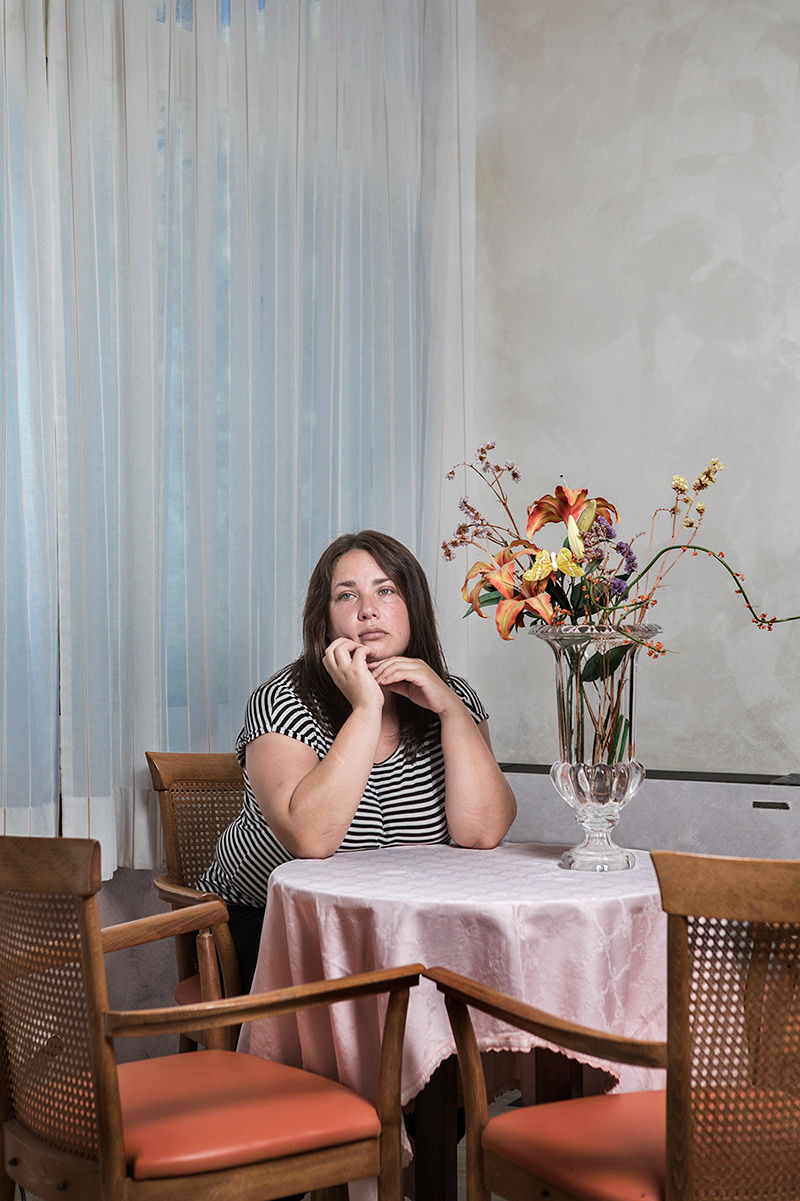
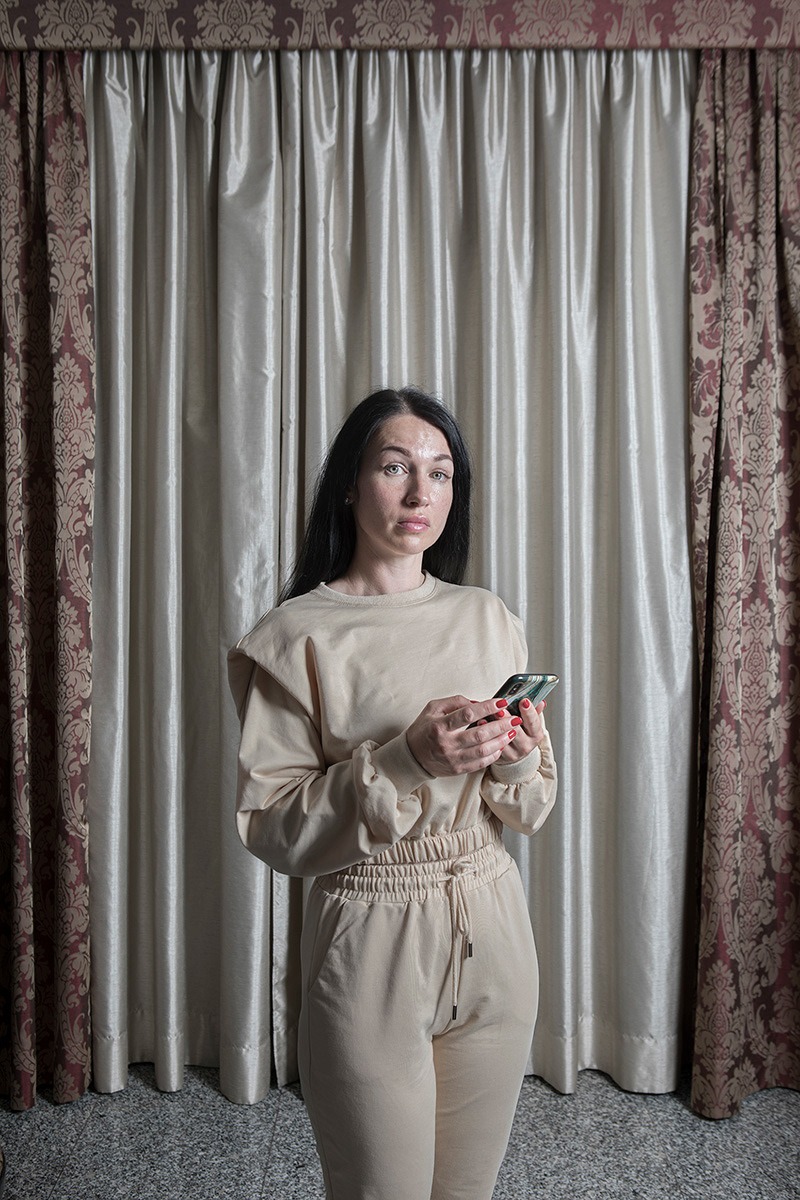
Frosinone, Italy – May 26, 2022. Nadiya Valiavskayia, 37, is staying at the Astor Hotel in Frosinone with other Ukrainian refugees. She comes from Mykolaiv and fled with her 18-year-old daughter, Katerina. Nadiya has a degree in psychology and worked as a manager for a jewelry chain, earning a good income. She also sold Italian clothing online and lived comfortably before the war. On February 24, 2022, she woke to the sound of explosions so strong that car alarms went off. She grabbed documents and essentials, woke her daughter, and took refuge in a friend’s building equipped with a bunker. For a week she stayed there, returning home only briefly to feed her dog and cat. Despite fear and uncertainty, she decided to leave on March 15. While she was packing, the power went out and she finished getting ready by phone light. A contact offered her a paid ride to Odesa, and from there she reached the Moldovan border, where she saw crowds of women and children fleeing. She crossed at Palanca by coach, then continued by bus to Chișinău, where she delivered forgotten documents to a friend. She shared a rented room for three days with three families, but when it was no longer possible to stay, she asked a woman she met on the street for help. The woman hosted her for a few days, and Nadiya showed gratitude by shopping and cleaning. On the fourth day, she was driven to the bus station and bought a ticket to Italy. After a 36-hour journey she arrived in Rome, where an acquaintance brought her to Frosinone. Once she completed the paperwork and received her residence permit, Civil Protection assigned her a place at the Astor Hotel, where she now lives.
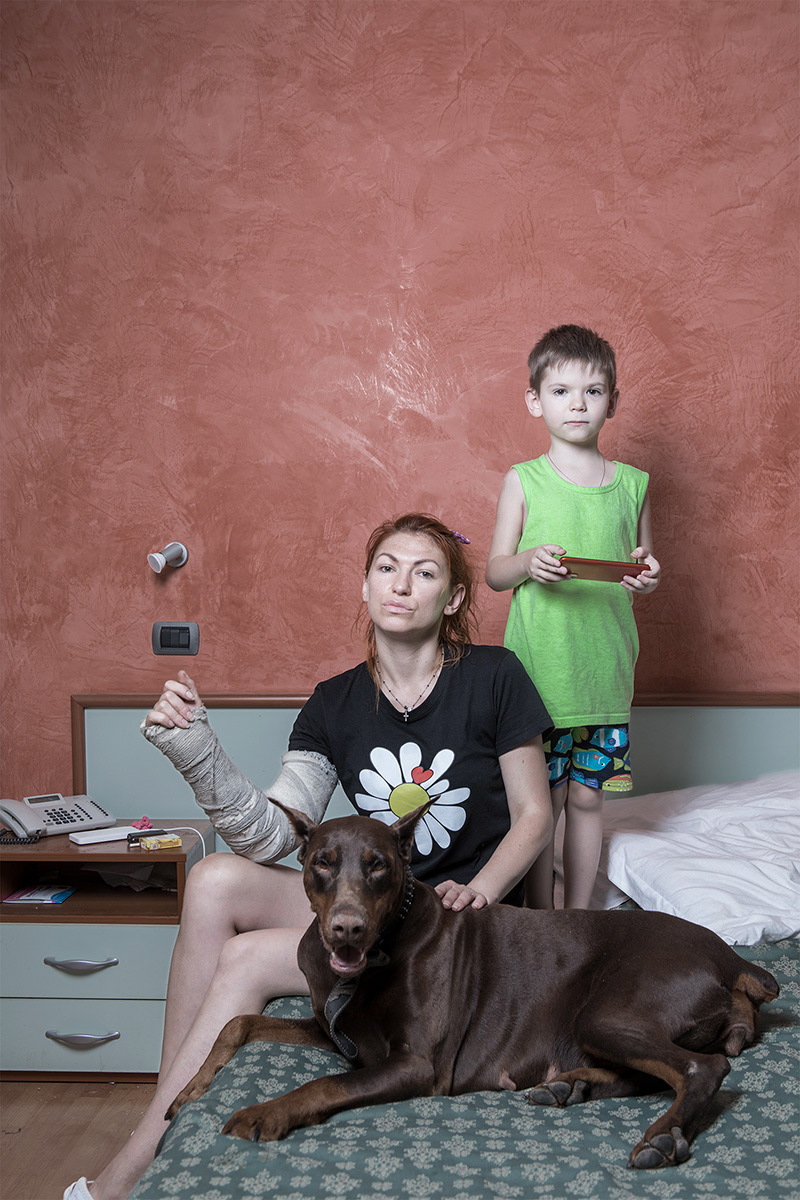
Frosinone, Italy – May 26, 2022. Lena Lisogor, from Kharkiv, is staying at the Astor Hotel in Frosinone with her son Egor and their dog Hana. She lived in the Severnaya Saltovka district, one of the first areas bombed. When the war began, she and her son spent 10 days in a damp bunker where children coughed constantly, and she still had to go outside under shelling to walk the dog. A friend helped them reach the chaotic train station in Kharkiv, where Lena boarded a train to Lviv without even knowing the destination. The journey was traumatic: the train was overcrowded, bathrooms were unusable, fights broke out, and she and her son stopped eating or drinking to avoid needing the toilet. After 20 hours they reached Lviv, where freezing temperatures, lost children and overpriced rooms made the situation desperate. Thanks to a friend’s tip, Lena found temporary shelter in an office until March 10, when bombing reached Lviv and she fled again. She took a taxi to the Polish border, was helped by volunteers in Medyka, then traveled to Warsaw, Germany and finally to Viareggio, Italy, where she stayed with a man she had met online. Once there, she discovered he was violent and using drugs. One morning he assaulted her, breaking her arm and threatening to kill her if she reported him. She escaped while his mother was present and, out of fear, lied at the hospital about the cause of her injury. After recovering for a few days at another woman’s home, she took a train to Rome, where the Red Cross welcomed her and transferred her to Frosinone, where she now lives safely with her son.
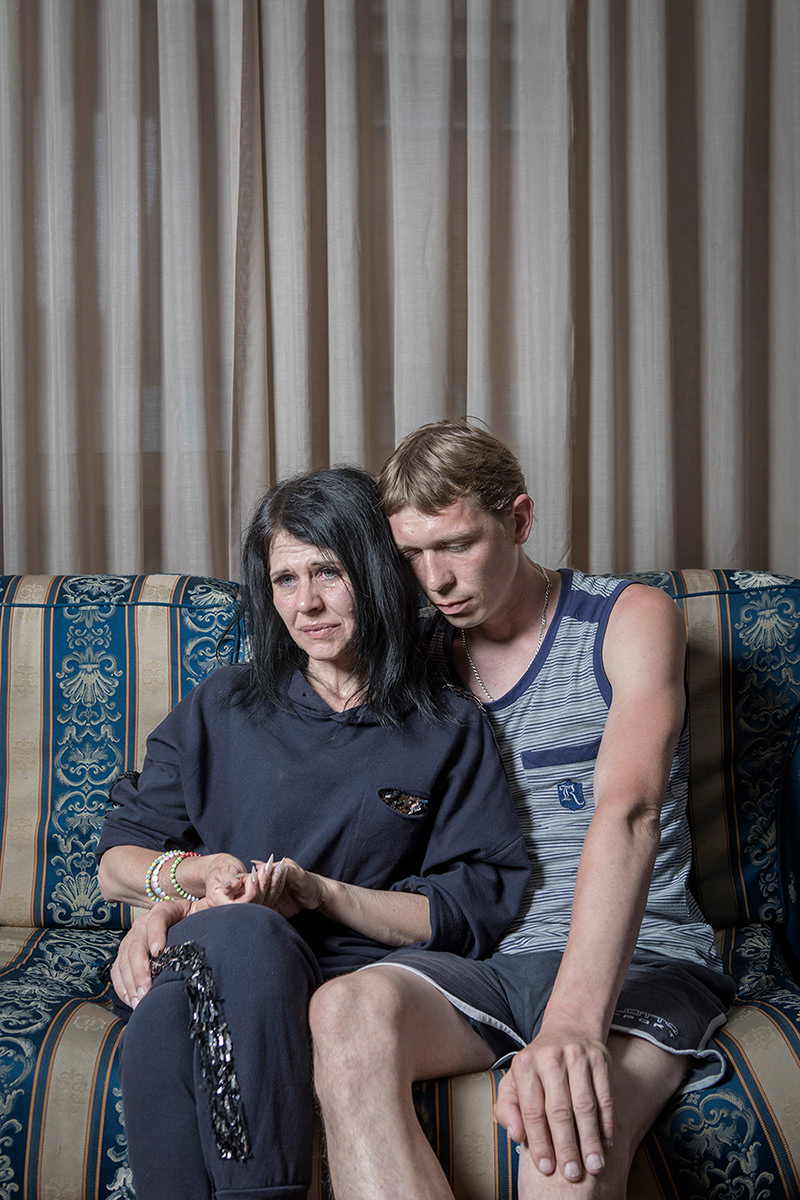
Fiuggi (FR), Italy – May 25, 2022. Artem (37) and Natalia (43) Velikozkie are staying at the Hotel Capri in Fiuggi with their four children: Sofia (20), Danil (14), Muroslava (12) and Anghelina (7). They come from Myrnohrad, a mining town 64 km from Donetsk, in the Donbas region. Artem worked as a maintenance technician in a coal mine, while Natalia was a homemaker. At the start of the war, they believed the fighting would remain far away and end quickly. But on February 28, military officers arrived at Artem’s workplace to draft male workers. Artem, exempt because he had more than three children, saw 200 colleagues receive the order. Missiles began flying overhead, food supplies grew scarce, yet they still hoped the conflict would not reach them. Artem kept working while Natalia stayed home with the children, who were studying remotely. By mid-March, many workers began requesting leave to evacuate their families, and manpower at the mine collapsed—one day only two people showed up for a 200-man shift. The Ukrainian army entered the town and set up headquarters inside the mine offices, and bombing intensified until the authorities ordered a full evacuation. Although Natalia’s mother and sisters left, Artem and Natalia still hesitated. They slept dressed, suitcases ready, running to shelters whenever the sirens sounded. Their eldest daughter Sofia finally forced a decision, telling her parents she would leave with her siblings if they didn't act. The family took the train to Lviv, unsure of what to do next. Arriving after a day and a half, Sofia chose to stay in Ukraine and volunteer, leaving her parents and siblings to seek refuge alone. They found temporary shelter in a railway building hosting refugees, where a volunteer advised them to go to Italy or Portugal. They chose Italy, crossed into Poland, and boarded a bus without even knowing their final destination. After arriving in Italy and being received by the Red Cross, they were transferred by Civil Protection to Fiuggi, where they now live with other Ukrainian refugees.
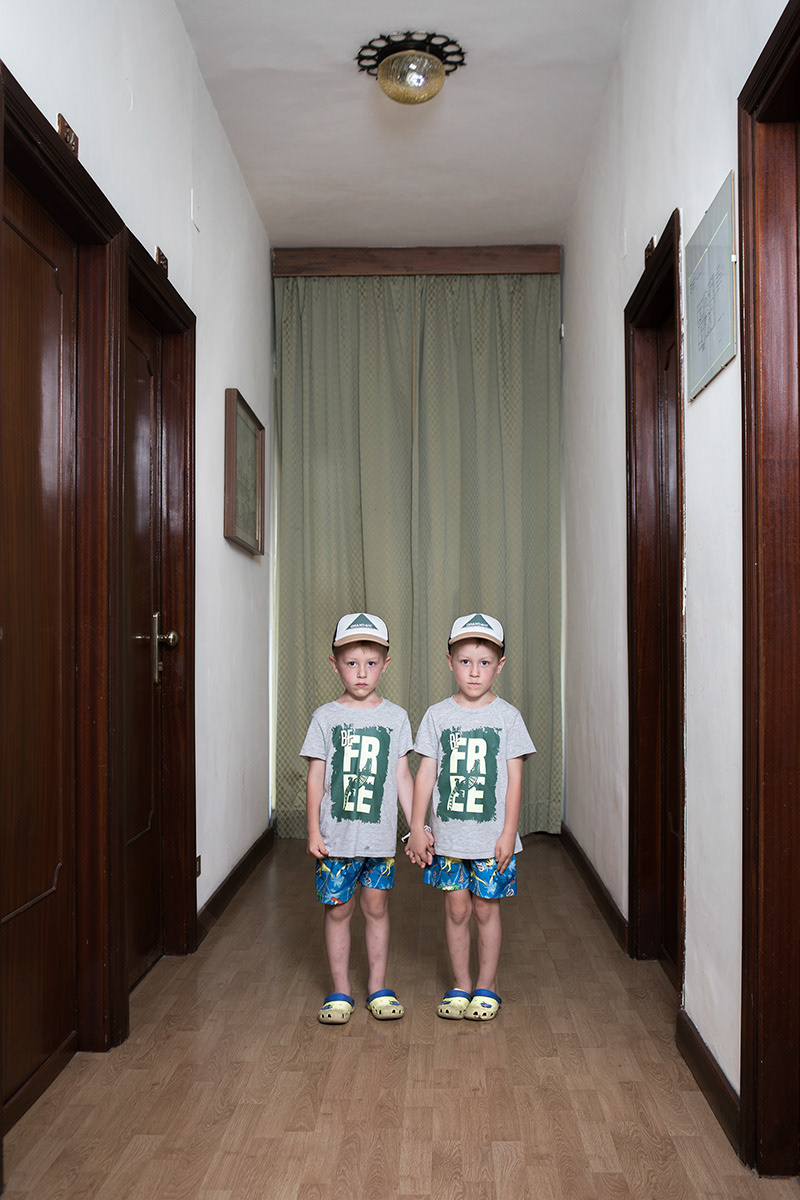
Fiuggi (FR), Italy – June 8, 2022. Zakhar and Nazar Piskun, 5-year-old twins from Sumy, are staying at the Holiday Hotel in Fiuggi with their mother, Yuliia, an elementary school teacher who still teaches online. The family lived in the countryside near the Russian border. On the morning of February 24, they woke to news of bombings and saw the sky turning red in the direction of the border. They packed quickly and fled with the twins’ great-grandmother, using all three family cars. On the way, a rocket landed beside the car carrying Yuliia’s father, but the family eventually reached the school where she worked and sheltered there for three days. When rockets began hitting a nearby military academy, they decided to return home, traveling in separate cars so the children would not be together if something happened. On the road they saw Russian military vehicles and heard gunfire, but managed to get back safely. Days later, a Russian tank stopped right outside their house, forcing the family to lie on the floor until it moved away. Soon after, Yuliia’s mother unexpectedly returned from abroad and reached Sumy via Poland and secondary roads, just as Russian forces withdrew. When a humanitarian corridor opened, the family agreed that Yuliia and the twins should leave Ukraine. Her husband drove them to Ternopil, then returned home while Yuliia and the children crossed into Poland. After a month hosted by a Polish family, she chose to continue to Italy on a friend’s advice. The Red Cross welcomed them at Fiumicino airport and sent them to Fiuggi, where they have been living since May 6.
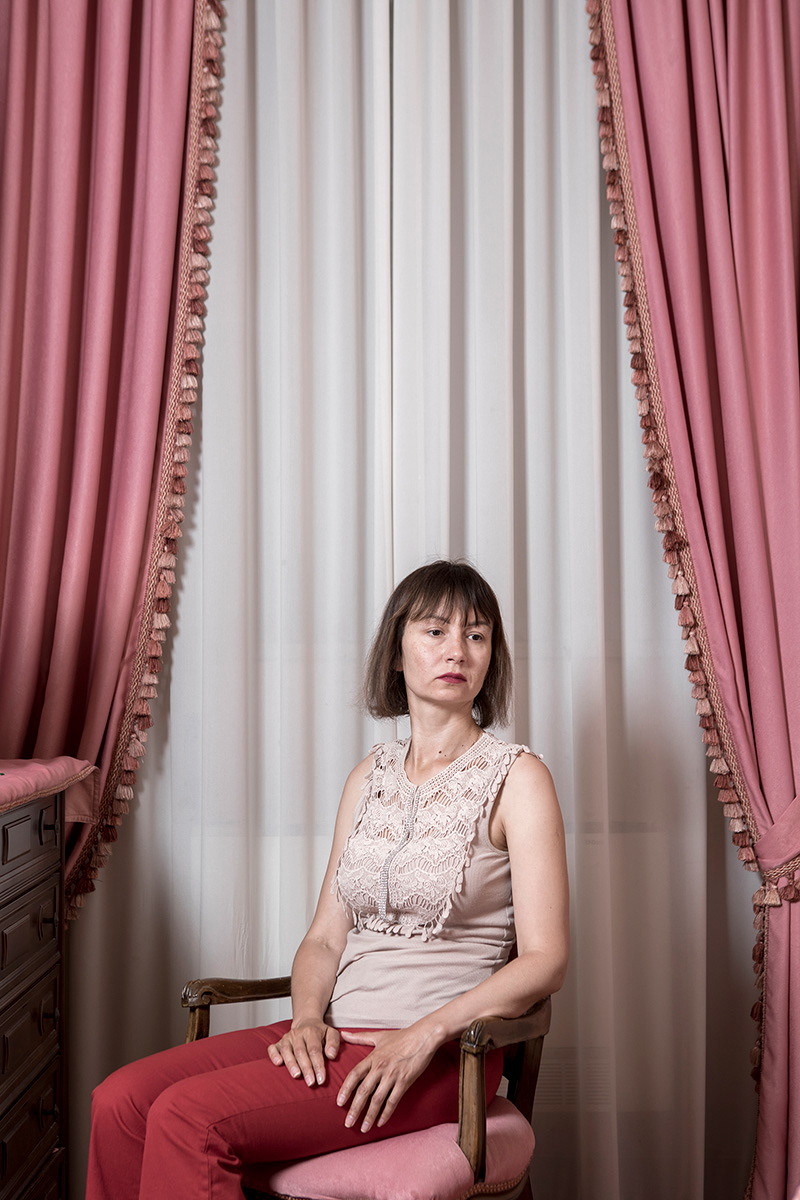
Fiuggi (FR), Italy – May 25, 2022. Svetlana Konovalenko, 40, is staying at the Lorella Hotel in Fiuggi with her 11-year-old son, Galeb, after fleeing the war in Kharkiv. She worked as a manicurist until February 24, 2022, when missiles began striking her neighborhood, located near military targets. Svetlana, her husband, their son, her sister and niece spent five days hiding in a freezing underground storage room with only basic supplies, unable to sleep as the ground shook from constant explosions. When her son could no longer stop crying, she decided to escape. The family drove through bombed roads with a “CHILDREN” sign on the car, needing 24 hours to travel just 80 km to Merefa. Even there, new airstrikes killed civilians and forced them back into a basement. The next day they left again, but fuel shortages, destroyed bridges and traffic jams blocked the route. Svetlana’s husband eventually brought her and the children to a packed train station and said goodbye. They managed to board an overcrowded train to Lviv, where 30 people shared a compartment built for four, with no air or light. After eight hours they arrived, waited seven more hours, and finally reached Poland when a conductor took pity on Svetlana after she begged to board. From Przemyśl they travelled to Kraków and then by bus to Italy. Arriving in Rome, they were received by the Red Cross and transferred to Fiuggi, where Svetlana now lives with other Ukrainian refugees.
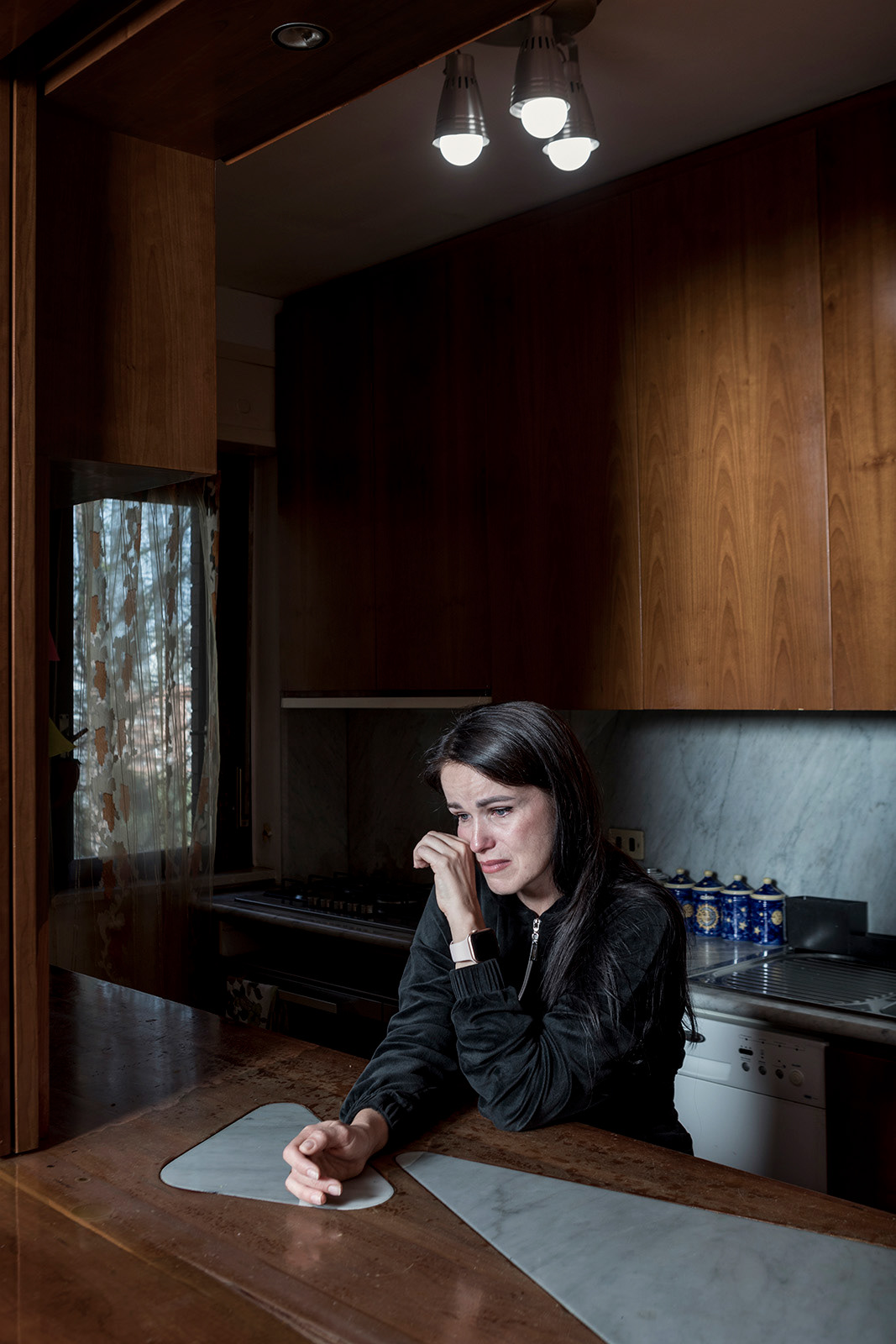
Rome (Italy), 27 october 2022. 36-year-old Oksana Andrushko portrayed at the apartment of the SAI Project "Aida Roma" in Rome Capital (ARCI Roma Aps and Be Free Soc. Coop.), Where she is staying with her two children aged 15 and 6. Oksana comes from Lviv, where she worked as a restaurant assistant manager, while her husband worked as a marble worker. Oksana's mother has lived in Rome for 22 years and Oksana and her family had already come to Italy several times, especially for the health care that her eldest son needs. Oksana, even before the war began, had already bought a plane ticket with departure on March 13 to have her son visited at an Italian hospital. Following the outbreak of the war, fearing that she would not be able to travel by plane due to the closure of Ukrainian airspace, she took the first available bus and headed for the Chop border, on the border with Hungary. On March 4, after three days in line at the border, he arrives in Italy. The first week she and the children were guests of the house where the mother works, where 12 lived in an apartment. Later she was transferred to a hotel and later to a reception center in Pisiniano, in the province of Rome. Due to the great distance from the hospital that his son is treating, he requested and obtained a transfer to Rome. 3 weeks ago the son underwent a preliminary surgery, pending the definitive one which will take place in a few months. Before the surgery, Oksana sent all the medical documents to Ukraine and managed to get her husband an exit permit, as the parent of a handicapped child. Now her husband also lives in Rome, temporarily in a hotel, and occasionally does some painting work. So far, over 100,000 people have fled Ukraine since the conflict began and arrived in Italy, mostly women and minors. To ensure their assistance, a system has been defined that provides for different forms of support that are complementary to each other. In addition to placement with Italian and Ukrainian families residing in Italy at the ordinary network of CAS (Extraordinary Reception Centers) and the SAI (Reception and Integration System), a widespread reception system has been introduced which assigns a key role to Third sector, to voluntary associations and religious bodies. The association or body must guarantee, in addition to food and accommodation, help with school and work integration, legal guidance, linguistic literacy and psycho-socio-health assistance.
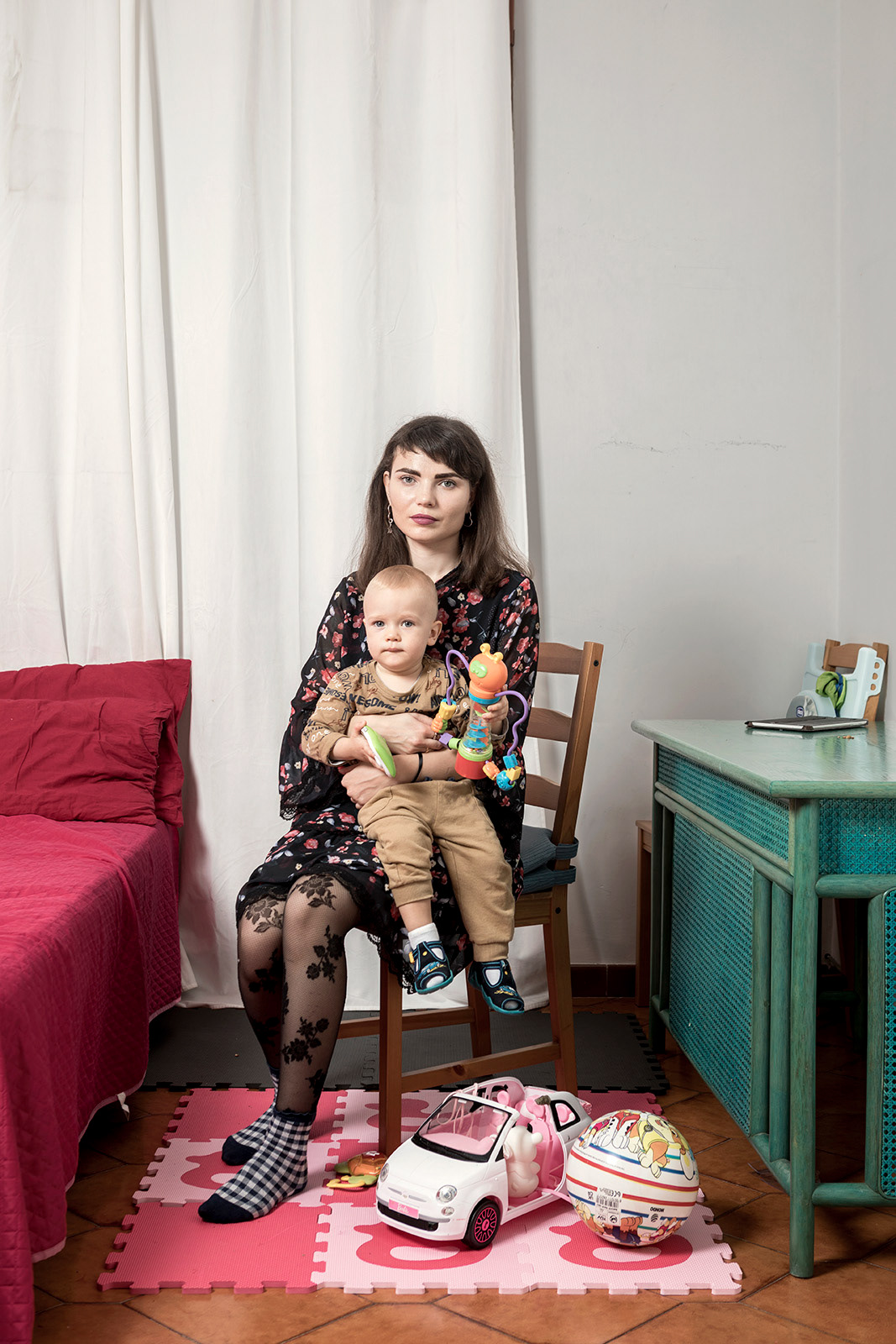
Rome (Italy), 28 October 2022. Daria Demydenko, 29, portrayed with her one-year-old son Svatoslav in the apartment of the SAI Project "Aida Roma" in Roma Capitale (ARCI Roma Aps and Be Free Soc. Coop.), Where is hosted with her 58-year-old mother Svetlana Hoshii. Daria was born in Kiev, raised in Paulograd and then moved to Dnipro. Daria graduated in medicine but was unable to complete her internship due to becoming pregnant. Daria remembers that the day before the start of the war there was already a certain nervousness in the air. When the war broke out, he initially believed it was a terrorist act. Her husband, who was staying with relatives at the time, told her to prepare to flee and that he, as a reservist (he teaches at the military academy and was already called to arms in 2014) would be drafted. Meanwhile, Svetlana from Paulograd arrives in Dnipro with the car used for transporting drugs, which is also ready to go. Daria remembers that the days following February 24 were dramatic: she remembers that on the streets people crowded in long lines to get food and there was a lot of confusion. On March 4, after an attempt that failed due to the huge crowd that stormed the trains, they managed to leave, also thanks to the help of a police officer who escorted them to the train to protect the child. The train was full of people. There was no free space and it was difficult even to go to the bathroom. The child was crying constantly from hunger, since Daria, not having hot water, could not prepare his meals. At each stop people kept getting on. He doesn't remember exactly where he was, but he says that at one point many people came from a country that had just been bombed. Daria also remembers the shooting at the train, which had to go back. Finally, after 24 hours, the train arrives in Lviv, where Svetlana, Daria and Svatoslav first find refuge in the room for women and children up to 3 years old set up near the first platform. Then, on the advice of a volunteer, they moved to another reception center set up near a Catholic church. There, 40 slept in one room, dividing a single mattress in three. They decided to leave for Italy because for France they would have had to pay € 150 each while only those who had relatives there could go to Germany. They manage to catch a bus that was returning to Italy after having brought humanitarian aid. After 35 hours of travel, of which 8 in a row on the border between Ukraine and Poland, they finally arrive in Rome. There they are welcomed by an Italian couple who provided them with all kinds of aid, from shampoo to clothing, and hosted them for 2 days. Subsequently, Daria, Svetlana and Svatoslav are transferred to a hotel, where they remain for 4 months and subsequently the apartment where they are still staying is assigned by ARCI. Daria manages to get in touch with her husband at the front only when the signal is reconnected to him. The husband, for security reasons, cannot tell Daria where he is.
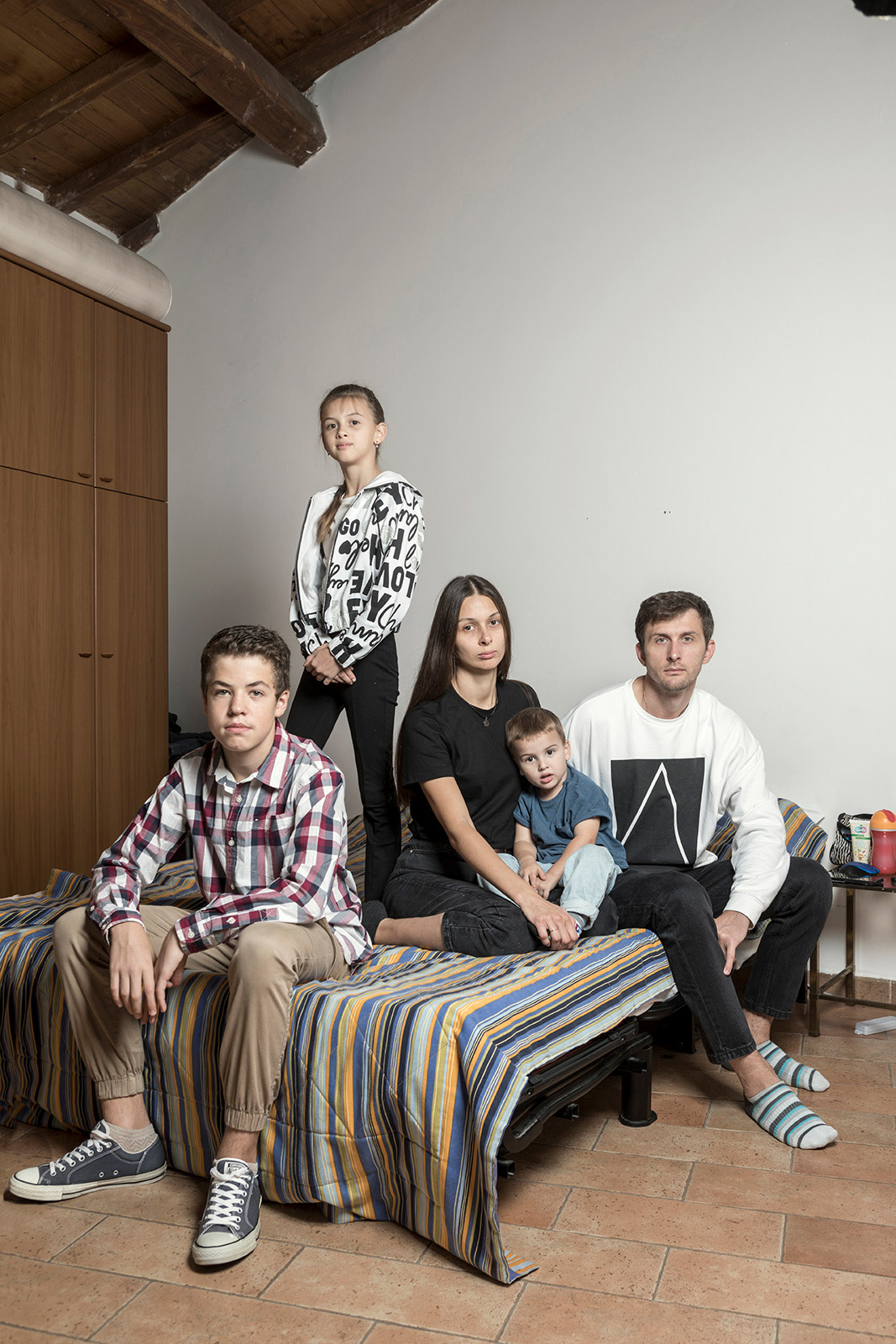
Sacrofano (Rome), Italy. 22 October 2022. The Plakhotina family, made up of Yevgen (38), Oleksandra (34) and their children Denys (14, adopted at the age of 10), Slaviana (11) and Savilii (3), in the house made available to them by the parish of Sacrofano, in the province of Rome. The family, originally from Mariupol, had lived in Odessa since 2019. Yevgen (who as a father of 3 children is exempt from martial law) works as a sailor for a Ukrainian shipping company, while Oleksandra, after her studies as a journalist, worked as a correspondent for a Mariupol station and for a magazine in Odessa. Now she takes care of the home and children full time and writes poetry. On 24 February, at the beginning of the Russian invasion, Yevgen was on board a freighter off the coast of Rotterdam, on the Netherlands, Finland and Russia routes. His phone did not pick up the signal, and he was informed of the start of the war by the second engineer on board, who, having a Dutch sim, was able to connect. Yevgen remembers initially thinking of a joke, but then when he connected through his colleague's hotspot, his phone was flooded with messages. The first thought was obviously of the family but he was unable to contact. Once in port, his phone was running regularly and he managed to get in touch with Oleksandra, who in the meantime was safely with her three children in a bunker in Odessa. Together they decided it was safer for Oleksandra and the children to leave Odessa. Oleksandra joins two other families and with three cars they head towards the border with Moldova. To get to the border, less than 100 km away, they took 18 hours, sleeping in the car. In her Oleksandra, she had also turned off the heating for fear of being suffocated by the exhaust fumes. At 8 pm they arrive at the border, and the men who drove the car had to turn back. Oleksandra and her children cross the border where they are looked after by volunteers and where they take the bus that will take them to Italy. Meanwhile, Yvgen, who was still at sea, asked to be landed in Rotterdam, two weeks before the end of the contract. He was supposed to disembark in St. Petersburg, but Yvgen refused after hearing that some members of another crew of the same company had been arrested by the Russian authorities and then reported missing. Yvgen thus lands in Poland, where he is greeted by employees of the shipping company who assist him and put him on a plane to Rome, where his family was waiting for him. The family was initially welcomed at a shelter and prayer center near Sacrofano, in the province of Rome, and then moved to a hotel in Pomezia, where they stayed two months waiting for a priest's house to be ready. of the Parish of Sacrofano where they still stay. Denys is attending the last year of middle school online and plays basketball for a team in Sacrofano. Slaviana is attending the last year of elementary school both on presence in an italian school and on line with her school in Odessa, and she also continues her violin lessons online. Since returning, Yvgen has also worked a shift at sea between the Netherlands, England and Spain. Only Yvgen's parents are left in Mariupol, who are retired and have decided to stay in their home. The father, even after retiring, provided consultancy at the Azovstal factory, where he worked.
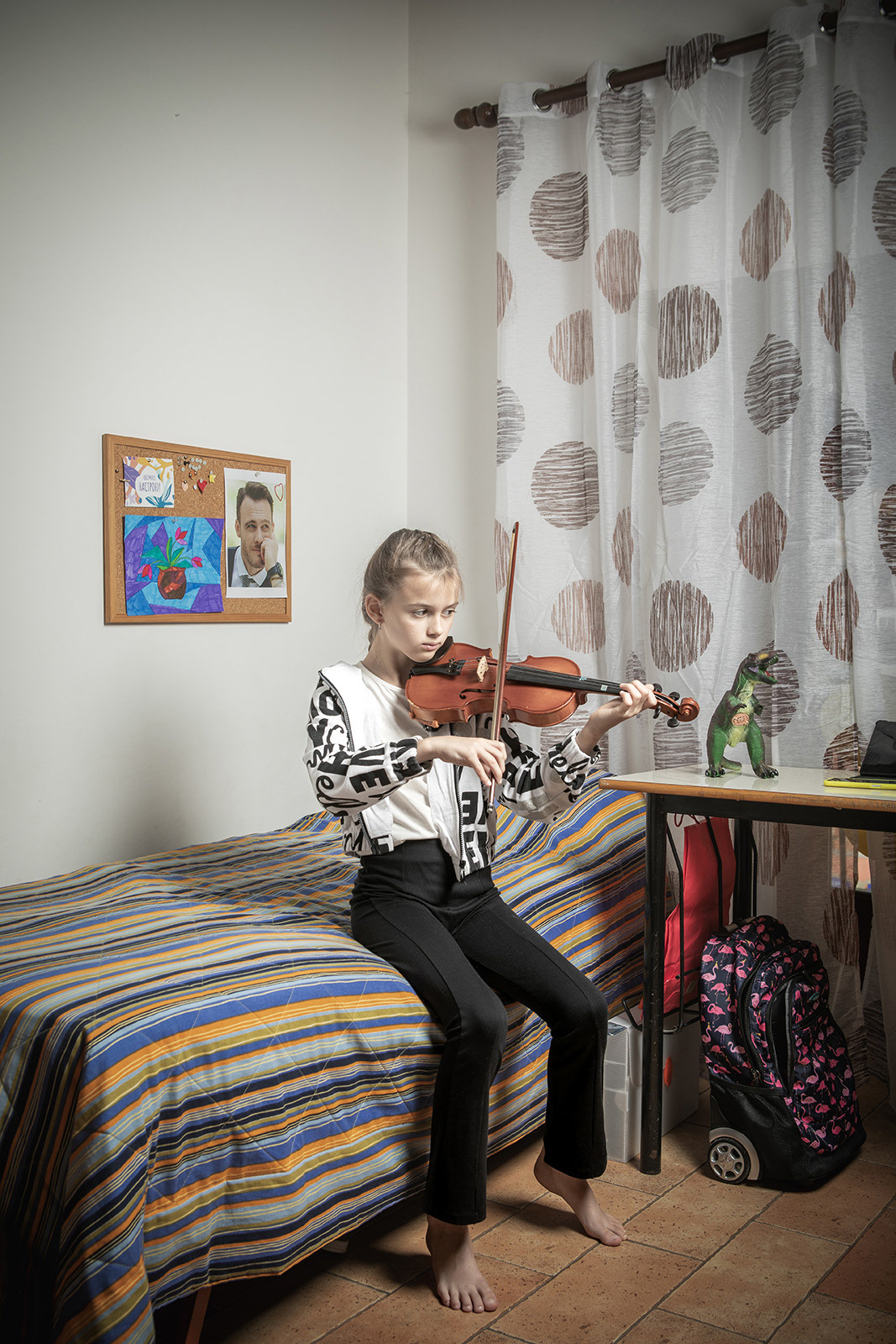
Sacrofano (Rome), Italy. 22 october 2022. Slaviana Plakhotina (11 y.o.) is reharsing for the exam she had attended on line with her music school in Odessa (Ukraine). Slaviana is hosted with her family in a house made available to them by the parish of Sacrofano, in the province of Rome. The Plakhotina family is made up of Yevgen (38), Oleksandra (34) and their children Denys (14, adopted at the age of 10), Slaviana (11) and Savilii (3), The family, originally from Mariupol, had lived in Odessa since 2019. Yevgen (who as a father of 3 children is exempt from martial law) works as a sailor for a Ukrainian shipping company, while Oleksandra, after her studies as a journalist, worked as a correspondent for a Mariupol station and for a magazine in Odessa. Now she takes care of the home and children full time and writes poetry. On 24 February, at the beginning of the Russian invasion, Yevgen was on board a freighter off the coast of Rotterdam, on the Netherlands, Finland and Russia routes. His phone did not pick up the signal, and he was informed of the start of the war by the second engineer on board, who, having a Dutch sim, was able to connect. Yevgen remembers initially thinking of a joke, but then when he connected through his colleague's hotspot, his phone was flooded with messages. The first thought was obviously of the family but he was unable to contact. Once in port, his phone was running regularly and he managed to get in touch with Oleksandra, who in the meantime was safely with her three children in a bunker in Odessa. Together they decided it was safer for Oleksandra and the children to leave Odessa. Oleksandra joins two other families and with three cars they head towards the border with Moldova. To get to the border, less than 100 km away, they took 18 hours, sleeping in the car. In her Oleksandra, she had also turned off the heating for fear of being suffocated by the exhaust fumes. At 8 pm they arrive at the border, and the men who drove the car had to turn back. Oleksandra and her children cross the border where they are looked after by volunteers and where they take the bus that will take them to Italy. Meanwhile, Yvgen, who was still at sea, asked to be landed in Rotterdam, two weeks before the end of the contract. He was supposed to disembark in St. Petersburg, but Yvgen refused after hearing that some members of another crew of the same company had been arrested by the Russian authorities and then reported missing. Yvgen thus lands in Poland, where he is greeted by employees of the shipping company who assist him and put him on a plane to Rome, where his family was waiting for him. The family was initially welcomed at a shelter and prayer center near Sacrofano, in the province of Rome, and then moved to a hotel in Pomezia, where they stayed two months waiting for a priest's house to be ready. of the Parish of Sacrofano where they still stay. Denys is attending the last year of middle school online and plays basketball for a team in Sacrofano. Slaviana is attending the last year of elementary school in an italian school and continues her violin lessons online. Since returning, Yvgen has also worked a shift at sea between the Netherlands, England and Spain. Only Yvgen's parents are left in Mariupol, who are retired and have decided to stay in their home. The father, even after retiring, provided consultancy at the Azovstal factory, where he worked.
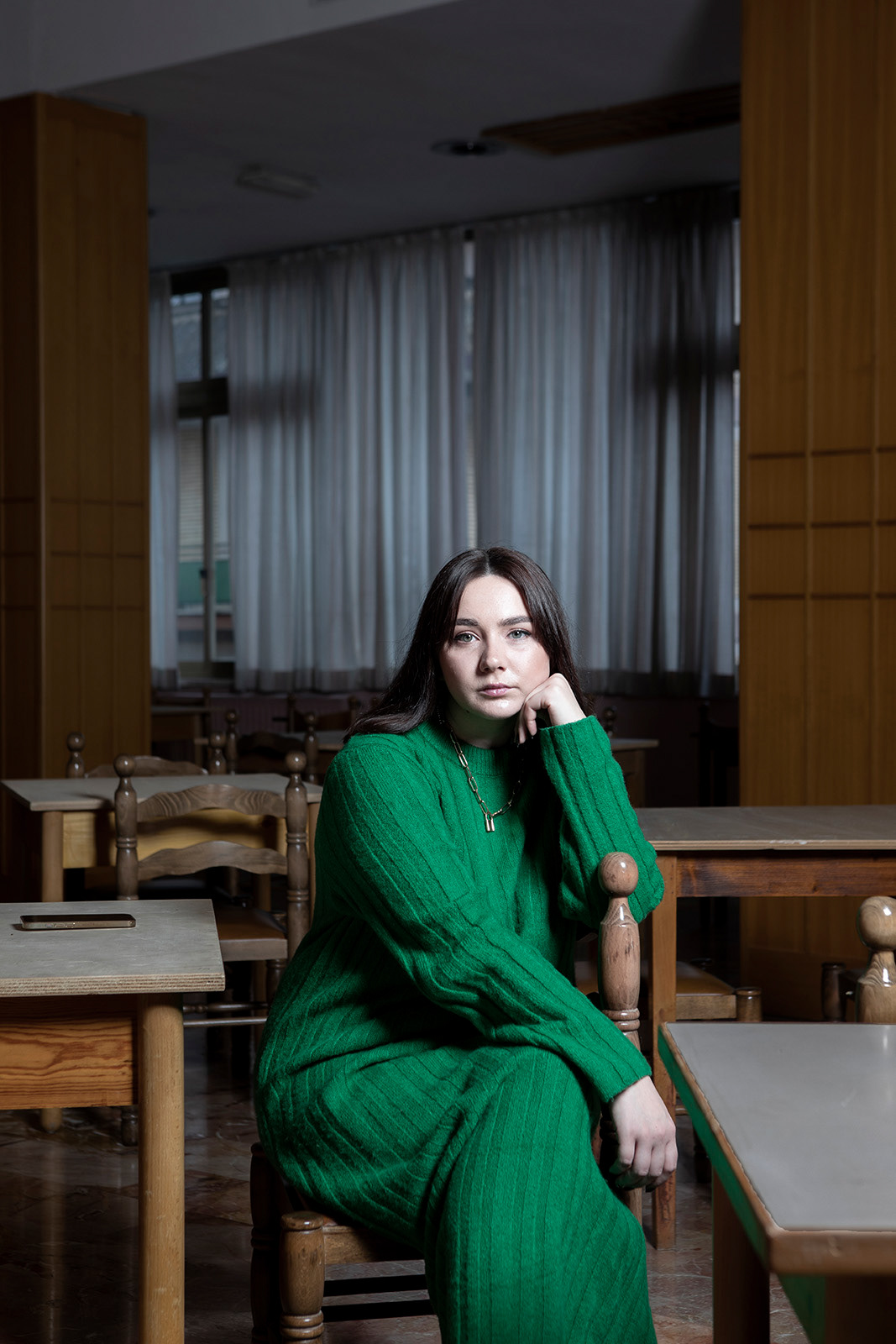
Fiuggi (FR), Italy, 16 December 2022. Yuliia Yurhina portrayed in the dining room of the Hotel Continental where she is hosted together with other Ukrainian refugees. Yuliia is 27 years old and comes from Zaporizhzhia. After graduating in Sociology and Politology he worked as an assistant for a local politician. Before the war he held two jobs: he was the executive director of a coworking (later permanently closed due to the covid) and he worked for an NGO that was involved in tutoring orphaned teenagers hosted in foster homes, to whom through the technique of debate (learned at university days when he had participated in various national tournaments) he taught to develop one's own critical thinking, that is to build one's own opinion and express it. After Covid he oversaw the electoral campaign of a candidate for mayor of Zaporizhzhia. Yuliia reports that she developed her interest in politics at an early age, when her great-grandmother read books to her about the Holodomor, the terrible famine that was caused by the USSR government in the territory of Ukraine from 1932 to 1933, causing several million dead, and that she herself had lived, living on grass and suffering the loss of five children. Yuliia decides to leave Zaporizhzhia only towards the end of April. He says that at the beginning of the conflict he constantly monitored the situation, feeling strong also from his studies, and tried to postpone a possible departure. After learning of the crimes committed by the Russian army in Bucha, she began to fear and for two weeks she could not decide to leave, overwhelmed by the guilt of having to abandon her family, who had decided to stay. It was only towards the end of April that she made the decision to flee and bought a ticket for Lviv with the intention of arriving in Italy, where she had already been three times. After a relatively uneventful journey he arrives in Lviv. From there she took a bus to Krakow, where a friend was waiting for her. He stayed with her for a couple of days before getting back on the road to Rome via Vienna. In Rome, waiting for her was a family from Viterbo that Yuliia had contacted through an advertisement. He stays in Viterbo for a few days, then decides to find an apartment. The cheapest he can find, however, is in Vieste, Puglia. She books the apartment through a well-known portal, but once she arrives there she discovers that the apartment that had been assigned to her is completely different from the one booked. She immediately makes a complaint and the owner kicks her out in a bad way, without letting her stay even one night. After a night spent in a hotel with other refugees, she sets out again for Rome, where this time, however, she turns to the Red Cross, which places her in the reception system and transfers her to a hotel in Fiuggi, where she still resides.
